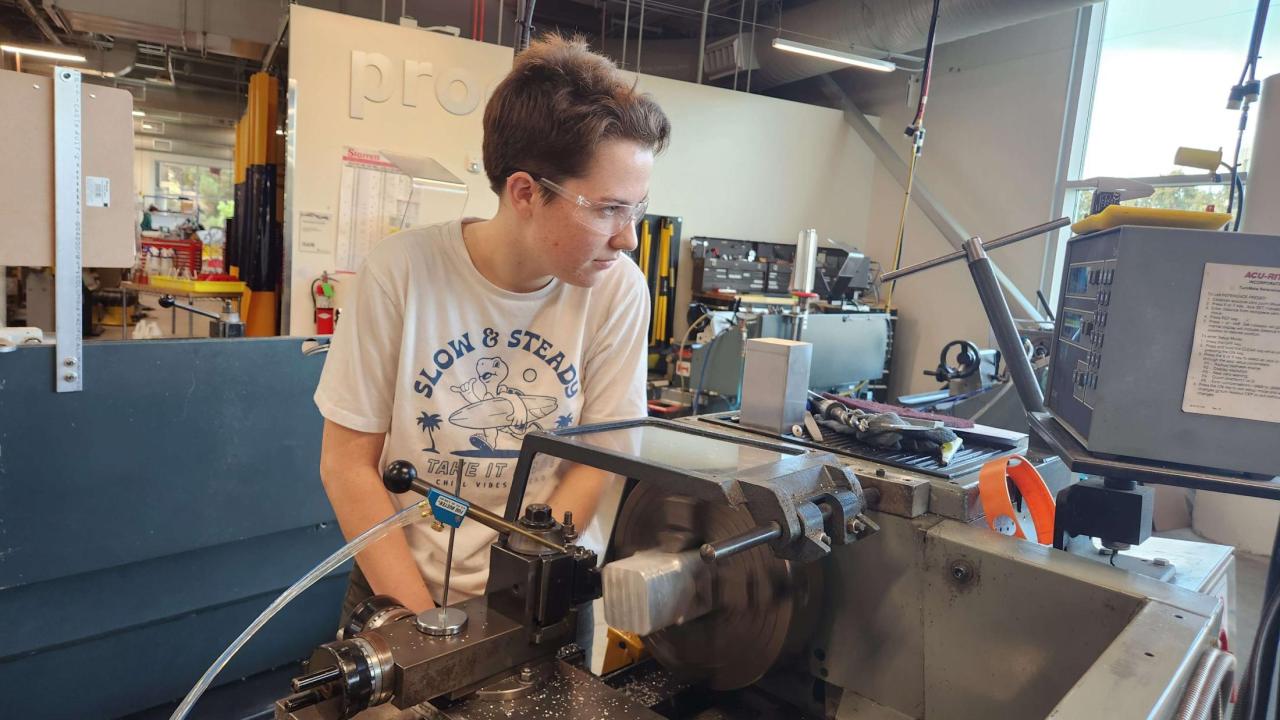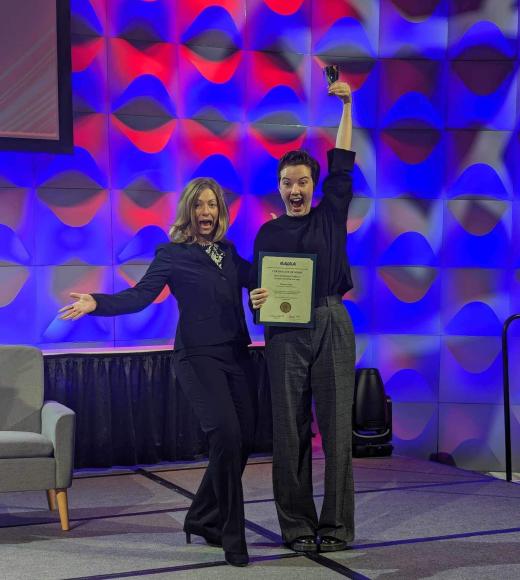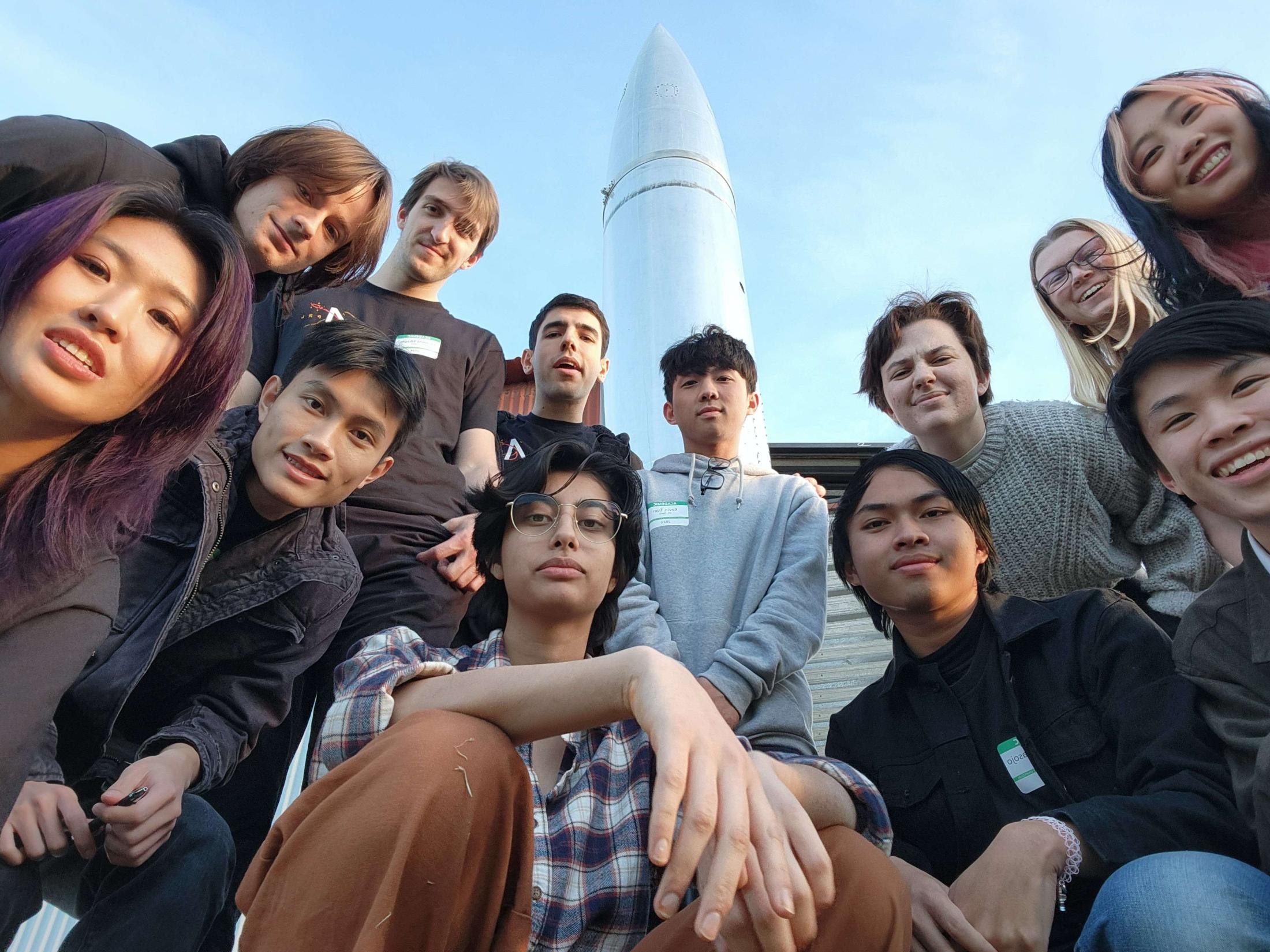
Rowan Glenn Takes Flight with Undergraduate Research
For Rowan Glenn, applying for the American Institute of Aeronautics and Astronautics, or AIAA, Jefferson Goblet Student Paper Award, wasn't top of mind while researching aviation with Assistant Professor of Mechanical and Aerospace Engineering Christina Harvey, who leads the Biologically Informed Research and Design, or BIRD, lab at the University of California, Davis.

So, it was a bit of a surprise when Glenn, a fourth-year mechanical engineering major, found out they had won the prestigious award for aerospace design and structures, typically presented to a Ph.D. student.
"It was a hectic month leading up to our research paper. I got so focused on the presentation about our research that I forgot that I had submitted for the award at all," they said. "I got through the presentation, and then a day later, Christina told me I won an award. I was like, 'I forgot I was doing that.'"
Between preparing to graduate and conducting award-winning research, plus their other obligations as a lead in UC Davis' liquid rocketry club and a machine shop tech at the Diane Bryant Engineering Student Design Center, or ESDC, Glenn is one busy undergraduate, going all in on everything they can.
Winging It
For their research, Glenn collaborated with Lucas Dahlke, a fellow mechanical engineering major, and Andy Engilis, the curator at the UC Davis Museum of Wildlife and Fish Biology, to collect data on the wingspan of birds to learn about aviation.
Glenn's team used an infrared and visual light scanner to create 3D models of 18 prepared bird wings, provided by Engilis, across several species. Glenn then adapted these models with a slicing algorithm for 3D printing, which slices a model into layers that the 3D printer prints, to measure the morphology of birdwings by extracting information about the shape of the wings' airfoils, or parts of the wing that create lift.
From there, Glenn compared the aerodynamic characteristics of the airfoils from gliding birds to the airfoils of flapping birds to determine if there were any differences between them. The research showed a statistically insignificant difference in the aerodynamic efficiency of the different airfoils, concluding that further research is needed.
Glenn will continue this research in collaboration with the University of North Carolina using their larger database of wing scans.
Glenn wasn't initially interested in bird flight research, but kept an open mind when they joined Harvey's lab. That willingness to try anything, coupled with their engineering skills and drive to excel, led to their research being recognized.
When speaking about undergraduate research and not letting fear limit their opportunities, Glenn said, "You're not going to feel qualified because you're an undergrad. But that doesn't mean you can't do it. It just means you just got to start."
Rocket Science, Literally
Glenn continues to apply that same openness and drive in all aspects of their student life. As the engine lead in the Aggie Propulsion and Rocketry Lab, or APRL, the first liquid rocketry team at UC Davis, Glenn is currently designing their first rocket engine with the club. They will travel to the Mojave Desert to perform a hot fire test on their engine, a huge milestone in the engine's development.

Another environment Glenn excels in is manufacturing at the ESDC. Glenn works part-time as a machine shop tech, getting more hands-on engineering experience and developing manufacturing knowledge. They maintain and service machines in the shop, train students to use shop equipment and manufacturing techniques and implement new organizational systems for the shop to improve the workflow and functionality of the shop.
Glenn is continually pushing to learn something new and apply maximum effort in all of their roles. They have learned that fear shouldn't stop them from trying out something new, which Glenn believes is a key part of the college experience and finding success.
"The thing I try to remind myself of is, it's not that I'm not finding it hard because I'm not competent enough," said Glenn. "I'm finding this difficult or confusing because the work is difficult and confusing. It's complicated engineering stuff. This work is hard. This is literally rocket science. That's why I'm finding it difficult, not because I'm not good enough to do this."
In their lead role at APRL, they make it a point to teach younger students about their lessons learned in intimidating research labs about fighting imposter syndrome and confidence.
Glenn plans to continue research as an undergraduate student, keep trying new things, and apply to grad school in a few years after graduating and starting work. In winning the Jefferson Goblet Student Paper Award, Glenn found a bit of outside validation that their plan, or lack thereof, is working.
"I like to joke with my friends that I'm an award-winning aerospace engineer now. I think it has solidified for me that just starting something and seeing what happens is a valid way to get work done."
